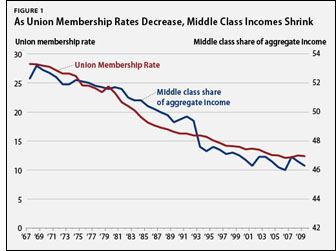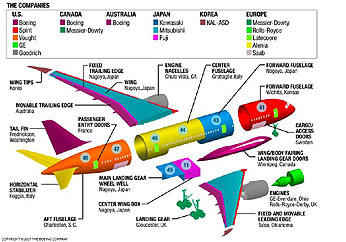NEWS ROUNDUP
Dropping ranks, 787’s market discipline, Jaime’s hostage…
Thursday, January 24, 2013
UNION MEMBERSHIP
 ► At Huffington Post — Union membership rate for U.S. workers tumbles to new low — Driven by widespread job losses in the public sector, the number of American workers belonging to a labor union has dropped to a record low of 11.3%, according to new data from the Bureau of Labor Statistics. Much of the precipitous fall in the public sector can be attributed to layoffs, particularly in public education and local government, where teachers and municipal workers are often unionized.
► At Huffington Post — Union membership rate for U.S. workers tumbles to new low — Driven by widespread job losses in the public sector, the number of American workers belonging to a labor union has dropped to a record low of 11.3%, according to new data from the Bureau of Labor Statistics. Much of the precipitous fall in the public sector can be attributed to layoffs, particularly in public education and local government, where teachers and municipal workers are often unionized.
YESTERDAY at The Stand — Union membership drops; Washington state still No. 4 — Washington state remains ranked No. 4 in terms of union density in 2012, with the state’s 513,000 union members accounting for 18.5% of the overall workforce. Only New York (23.2%), Alaska (22.4%) and Hawaii (21.6%) and have higher unionization rates than Washington. Neighboring Oregon ranks 9th in union density (15.7%).
► At AFL-CIO Now — Trumka reacts to latest union membership numbers — Says the AFL-CIO leader: “We enter 2013 with our eyes open and understand that these challenges offer real opportunities for working people to reshape the future. Working families are building community alliances, engaging with young workers and immigrants, fighting right-wing politicians and organizing in innovative ways. From taxi workers to teachers to nurses to Wal-Mart workers to port workers to freelance writers, working Americans are committed to building a new movement for the future and to creating good jobs and an economy that works for all.”
BOEING
 ► At Huffington Post — ‘Market discipline’ for the 787 (by SPEEA’s Stan Sorscher) — Years ago, a financial analyst explained to me that “market discipline” could save Boeing money on coordination costs and replace all the various integrated design and manufacturing teams. Under the traditional Boeing business model that relied on those teams, the 777 was built on schedule and delivered on time; it qualified for long-range operations over water at entry into service; it had great dispatch reliability from the beginning; it is currently making customers happy; and is making money for shareholders.
► At Huffington Post — ‘Market discipline’ for the 787 (by SPEEA’s Stan Sorscher) — Years ago, a financial analyst explained to me that “market discipline” could save Boeing money on coordination costs and replace all the various integrated design and manufacturing teams. Under the traditional Boeing business model that relied on those teams, the 777 was built on schedule and delivered on time; it qualified for long-range operations over water at entry into service; it had great dispatch reliability from the beginning; it is currently making customers happy; and is making money for shareholders.
 In contrast, the business culture on the 787 program was structured, from the beginning, to skip all those coordination costs and rely on “market discipline.” It relies much more on suppliers for design and manufacturing. Coordination and problem-solving are relatively weak. Program leaders seem paralyzed when problems come up, because authority for fixing problems is also diffused into the supply chain.
In contrast, the business culture on the 787 program was structured, from the beginning, to skip all those coordination costs and rely on “market discipline.” It relies much more on suppliers for design and manufacturing. Coordination and problem-solving are relatively weak. Program leaders seem paralyzed when problems come up, because authority for fixing problems is also diffused into the supply chain.
At this point, I don’t see how you can argue that the 787 business model is more “efficient” than the strong integrated teams we had in earlier programs.
► In today’s Seattle Times — Top regulators defend grounding of 787 — The top two federal regulators who grounded Boeing’s 787s over battery problems vigorously defended their decision Wednesday amid uncertainty about when the jetliners will be cleared to fly again.
► In today’s NY times — Boeing’s battery problems cast doubt on appraisal of new technologies — The 787 grounding raises fundamental questions about how federal regulators certify new technology and how they balance advances in airplane design and engineering with ensuring safety in commercial flying.
► In today’s Seattle Times — 787 battery blew up in ’06 lab test, burned down building — The Air Line Pilots Association raised concerns about Boeing’s battery-fire-protection plan in the course of the FAA certification process. During the public-comment period in 2007, the pilots union stressed that “a fire from these devices, in any situation, is unacceptable.”
► From Forbes — What went wrong at Boeing? — While Boeing’s CEO was in Chicago, strategizing about the future of Boeing and discussing civic goals with CEOs from other companies, the managers back in Seattle were making business decisions about tiresome “how-do-you-design-an-airplane stuff” that would determine whether there would be a firm to strategize about.
STATE GOVERNMENT
► At PubliCola — This week in Rodney Tom’s Olympia (by Brendan Williams) — Week two of the Rodney Tom era in the Senate opened with efforts to dismantle our state’s century-old industrial insurance protections for workers. And so much for bipartisanship.
TAKE A STAND — Protect the safety net for injured workers!
 ► In today’s News Tribune — Finishing SR 167 should be high on delegation’s to-do list (editorial) — Fortunately, it’s looking as though enough stars might be aligning to push through some kind of funding package in the state Legislature. Money is needed to maintain existing roads and bridges; half of the state’s roadway surfaces will be in poor shape within a decade unless repairs are made. SR 167 has been on the back burner longer than just about any project. It’s finally time to get it done. Pierce County legislators must insist that it be included in any transportation funding package.
► In today’s News Tribune — Finishing SR 167 should be high on delegation’s to-do list (editorial) — Fortunately, it’s looking as though enough stars might be aligning to push through some kind of funding package in the state Legislature. Money is needed to maintain existing roads and bridges; half of the state’s roadway surfaces will be in poor shape within a decade unless repairs are made. SR 167 has been on the back burner longer than just about any project. It’s finally time to get it done. Pierce County legislators must insist that it be included in any transportation funding package.
► From AP — Lawmakers looking at buying ferries from out-of-state — State lawmakers may reconsider the law that requires new ferries to be built in Washington in light of an audit suggesting that they could be built cheaper at shipyards out of state.
EDITOR’S NOTE — As previously editor’s noted, this audit failed to include any kind of cost-benefit analysis of the advantages of having ferries built locally by local businesses and local workers who inject that money into our local economy. More on this in next week’s WSLC Legislative Update.
► In today’s Columbian — State to weigh in on light-rail petition controversy — At the request of Sen. Don Benton (R-Vancouver), the state Attorney General’s Office will weigh in on a controversy surrounding a petition that fell just short of the required number of valid signatures to get the Vancouver City Council to put light rail to a public vote.
 ► In today’s News Tribune — Unreformed health care a threat to Washington’s future (by Rep. Nathan Schlicher) — Patients’ stories are on my mind as I become the only physician in the Legislature during this critical session when the state is implementing the new Affordable Care Act. The ACA is not perfect. But now that it is the law of the land, it is serving as the catalyst for a long overdue conversation about fundamental reforms that are needed to address the costs of health care.
► In today’s News Tribune — Unreformed health care a threat to Washington’s future (by Rep. Nathan Schlicher) — Patients’ stories are on my mind as I become the only physician in the Legislature during this critical session when the state is implementing the new Affordable Care Act. The ACA is not perfect. But now that it is the law of the land, it is serving as the catalyst for a long overdue conversation about fundamental reforms that are needed to address the costs of health care.
LOCAL
► In today’s Seattle Times — Highway 99 tunnel machine damage could delay dig — The mammoth Highway 99 tunnel machine will start its journey under Seattle a few weeks late, after workers at the Japanese assembly site found damage to the rotary drive that spins the cutter head. Instead of a June 3 launch, the boring machine will embark from Sodo to South Lake Union sometime this summer.
► In today’s Spokesman-Review — Hanford construction needs to slow down (editorial) — It’s time for a timeout that reduces work to a minimum that would sustain the core of highly skilled engineers, technicians and workmen on the project. A study analyzing what is known and what needs to be known for final design will not be completed until August 2014.
CONGRESS
 ► In today’s Columbian — Herrera Beutler votes ‘no’ on debt ceiling deal — U.S. Rep. Jaime Herrera Beutler (R-Camas) was one of 33 House Republicans to vote on Wednesday against extending the nation’s debt limit for the next three months. She said she will only vote to extend the debt limit when, at the same time, she can vote for a plan that makes significant progress on reducing the nation’s $16 trillion debt.
► In today’s Columbian — Herrera Beutler votes ‘no’ on debt ceiling deal — U.S. Rep. Jaime Herrera Beutler (R-Camas) was one of 33 House Republicans to vote on Wednesday against extending the nation’s debt limit for the next three months. She said she will only vote to extend the debt limit when, at the same time, she can vote for a plan that makes significant progress on reducing the nation’s $16 trillion debt.
EDITOR’S NOTE — The threat of refusing to pay the nation’s bills every three months is doing real harm to our economy and killing jobs right here in Washington state. Our fragile economic recovery cannot afford to keep lurching from one Republican debt-ceiling hostage crisis to another. Stop tanking our markets and killing jobs with your threats to default on America’s commitments and shut down the government. Pay your bills! That’s the bare minimum of responsibility and competence we expect from Congress.
► At AFL-CIO Now — House postpones debt-limit deadline to May 18 — This is good news — no doubt about it — and it shows the power of working people when they make their voices heard. But don’t think for a second that Republicans have given up trying to tank the economy to get their way. Or trying to cut Social Security, Medicaid and Medicare benefits. Or trying to cut taxes for Wall Street and rich people. Because they haven’t and they won’t. This fight is still on.
► In today’s NY Times — A debt crisis averted — for now (editorial) — House Republicans dropped their extortion over the debt ceiling, but a three-month extension is too short.
 ► At TPM — Reid, McConnell near deal on scaled-back filibuster reform deal — The deal, which is not yet final, makes very modest changes. It reflects the plan that Sens. McCain and Levin put forth to avoid further-reaching filibuster reform that proponents wanted. The emerging accord is a major step away from the Merkley-Udall “talking filibuster” plan which would have required a filibustering minority to occupy the floor and speak ceaselessly until one side gives in.
► At TPM — Reid, McConnell near deal on scaled-back filibuster reform deal — The deal, which is not yet final, makes very modest changes. It reflects the plan that Sens. McCain and Levin put forth to avoid further-reaching filibuster reform that proponents wanted. The emerging accord is a major step away from the Merkley-Udall “talking filibuster” plan which would have required a filibustering minority to occupy the floor and speak ceaselessly until one side gives in.
► At Huffington Post — Business lobbying soared in 2012 — Leading the pack in annual spending was the U.S. Chamber of Commerce. Its spending topped $125 million, an 88% increase from the previous year. The lobbying figure doesn’t include more than $36 million the group spent influencing the 2012 elections ($28 million of which funded attack ads against Democrats).
TODAY’S MUST-SEE
► Jon Stewart takes down Paul Ryan…
The Stand posts links to Washington state and national news of interest every weekday morning by 9 a.m.





